- Home
- Mary Anne Kelly
Jenny Rose Page 18
Jenny Rose Read online
Page 18
“Come when the sun goes down,” she said, “that’ll be time enough.” She stepped to her right. “I wouldn’t come before.”
“Right. See you then.” The desperate pursing of her lips and the overly casual gleam in her eye alerted me that there was something else. I leaned a little past her thinking maybe Uncle Ned was there inside. Peripherally, I took in big feet sprawled and deadlike on the parlor floor. My heart lurched and I almost let out a scream. Aunt Bridey knew he was there, though. The unnaturally deliberate set of her position, I realized, had been to keep my eyes away from him. I recognized those lunky, muddy boots. It was Liam, drunk on the floor, heavy and unmovable. I wouldn’t let on for the life of me. I made a great show of stretching and yawning theatrically so I could get away with her dignity intact.
Taking the middle road, the bog road, I walked thoughtfully to Molly’s, waiting, the whole time, for something to happen. Of course nothing did. I just saw a lot of birds. They fussed and barn-yarded about, bickering. I got to Molly’s, the prettiness of the place striking me as always, the white hydrangea pruned like a little olive tree, the abrupt stalks of foxglove and hollyhock already sprouting from decaying tulip husks. She’d left her basket on the step, filled with geranium seedlings, and her straw hat, which I unkindly imagined a step too romantic, was draped across the barrow. The front door stood open and I went in. The clock was ticking on the mantel. “Anyone here?” I called. Disappointed, I climbed the carpeted stair, hearing the age of the house with every creak. There didn’t seem to be anyone else staying, at the moment. I supposed the Germans had moved on. I sat in my yellow room and looked out the window down the road. All right, here I was. I took off my clogs and shaved my legs in the tiny sink, creaming them with slithery aloe cream. All set now. Time on my hands. Where was he? I washclothed myself shiny in the bathroom magnifying mirror, then sat down, exhausted with apprehension, on the vanity chair.
Enough. I wasn’t going to sit around the house waiting for him to find me. I went down the stairs to a still empty house. Molly had said I could use the bicycle any time. I walked around the property looking for it, but she must have taken it herself, I thought. I took a peek in the shed. It wasn’t there. I was more than a little shocked to see the state of that place. It was worse than my own unkempt cellar. It was more like slovenly. I wouldn’t mention to her I’d been in it, I thought, suspecting it would embarrass her. I brushed the filth from my hands and opened the door, rubbery with paint, to the reassuring dim sky. I’d march into Skibbereen.
I went down the road, enjoying the walk but you know the way it is, when you don’t want the bus, there it is. Fiona Ferry of the badly set broken foot and the bell-clear voice was in her spot and I sat beside her.
“Taking in the town?” Her blue button eyes twinkled.
“Yes.”
“You wouldn’t want to miss the Gorta Thrifty Shoppe,” she advised me. “It’ll be just over the bridge from Bridge Street.”
I promised her I wouldn’t think of missing it and told her about Jenny Rose’s plan for a “fish hunt” for Mrs. Wooly.
“That’s a grand idea now,” she said. “’Tis a scandal her own children won’t do a thing to help her.”
“Yes.”
“I hope they hear of it and hang their heads in shame.”
A thought occurred to me. “Miss Ferry,” I said, “I wonder if you knew my mother? Mary Cashin? She would be a lot older than you, of course.”
Her eyes lit up. “Mary Cashin is your mother? Sure, I knew Mary. A lovely young lady she was! We said rosary together at Miss Devlin’s house on Tuesdays. She went off to the States with a Slavic fellow and then the others were left with no one for their card games. Gentry he was. Oh, we were all agog.”
“Polish. Breslinski. Stan Breslinski. That’s my dad.”
“He didn’t come with her last time she was here.”
“No. He was home with the rest of us.”
“A lovely looking man, he was. There were those who thought that match would never last.”
“Really? Why’s that?”
“Well now, she a country girl. And he … a gentleman.”
She looked at me and I at her. We each had our own thoughts.
The bus hit a rut and up we went. We both just missed the ceiling and cried out in operatic abandon.
“Miss Ferry,” I said, “you have such a lovely voice. And you’re practically a professional. Would you start off the contest with a song?”
“I would,” she said.
“Good,” I said. “I’ll have Jenny Rose phone you. Maybe Willy. And tell you the time.”
“Oh. I know when it will be,” she said. “Just after early mass. There’s no other time it could be.”
“Oh. So, may I have your number?”
“Just get in touch with me so…” She moved uncomfortably. “You always know where I am, like.”
“I get it. On the bus.”
“Righteo.”
“Now, Miss Ferry, I’m going to take your picture. Please do not say cheese.”
“I wouldn’t.” Her eyes twinkled.
Before you knew it we were in town and I got up and lurched down the aisle. “Goraivh maith agat,” she called from her seat, which means, I think, may goodness be with you, and she waved to me from the mucky window, too. Mike, the bus driver, waved as well. He had luxurious long eyelashes, I noticed. Another week, I thought, and I’ll know the mayor. I stood there and waved back as the bus drove off. I was sorry about Liam. I know what a drag it is to clean up after someone so impossible but I still felt sorry for him. I wished I could have spoken with him right now, I was in the mood for his kind of talk, biting and funny and punctuated by lines of obscure poetry.
There was a tiny shop no bigger than a closet, the old letters of “The Eagle” worn away, now entitled “The Favorite.” I squeezed in and bought myself a pack of cigarettes. I didn’t open them, just paid for them and put them in my pocket, thrilled with the sin of it. It was exciting to be in my mother’s town, where she’d turned from girl to woman. Now that I had time to look around, I recognized names from the stories she’d told us. There was Hegarty’s Taxi Stand. What had been a horse and cart was now a modest car. And there was Mr. O’Leary, the nice jeweler in the brown shop where my parents had come to choose their wedding rings. The plain gold band she still wore. I caught the glint of my own reflection in the window, went to put my hand away guiltily into my pocket, then recalled Portia McTavish’s blissful expression and pulled it right out. I bought myself a nice pair of brown leather clogs at the corner shop to comfort my pride.
There’s an alley up North Street. A dark, wide tunnel of blackened, worn stone. It leaves the clatter, shops and traffic and forms a dark frame, going far back, moving off to the left in a zen off-centering and then opening onto a tiny view, like a portrait up on a wall, of lively green pastures and hills. The River Ilen winds through a lush place that, although you can’t see it from where you stand, you can feel a cameo of evergreen. North Street is a busy modern street, and to catch a glimpse of the evergreen like that, so near, so fair, I had to stop. I put my package on the ground and took what I felt was a perfect picture. Then I remembered Miss Ferry’s Gorta Thrifty Shoppe so that’s where I went. I crossed the rickety bridge, just painted, the door rattling with reindeer bells as I went in.
Two ladies in jersey dresses and peppery jewelry were rearranging the shelves.
“Just a tourist poking around,” I admitted.
“Is that right?” She and the other woman looked at each other with tidy smiles and doubtful brows. Nice ladies. What you’d call church ladies. They weren’t inclined to bother with me after quickly assessing me as an embroidery hunter, so I was able to amble freely up and down the aisles. I just like to look around at all the stuff. Up on the wall, behind the wads of Keen imitation pictures and Ramsey Lewis cassettes, a painting glowed softly. It was just a pot of flowers, but the gauzy scarf beneath it seemed to float and shimmer
with Jenny Rose’s unmistakable translucent light. It moved like a river. “How much is the painting of the kitten with the round eyes?” I called out.
“Five and sixpence.” She looked at the other woman in the yellow hat.
I sighed. “Too much for me. What about the little one behind it?”
She hardly lifted her head. “Six pounds.”
Feigning disappointment, I trudged on.
“Well, that one’s been there for a while. I’ll let you have that for three.”
“Okay.” I scratched my neck. “Say. Have you got another to match it? The same size, I mean?”
“You know”—she pushed her glasses up her nose—“I think I do. Eileen? Do we still have that cliffs one? You know. The water looks all sparkly.”
“I wanted that for Brian for the garage.” She frowned.
“Never mind, then.” I turned away and picked up a ceramic owl. I waited.
“Come on, Eileen. Let her have the match.”
“All right,” I heard her mutter. “But when Rita Keane’s recycle bundle comes, I shall take first choice.”
“Here you are, miss. For your bedroom wall, are they?”
“No.” I smiled happily. “They’re a gift,” I said. And then, “For my sister.”
She wrapped them in newspaper. The lady nudged me on the shoulder. “I’m on to you, miss.”
“Yeah?”
“You’ll be wanting those for the frames, won’t ya.”
“Caught me.” I winked. I went out and then, I couldn’t help myself, I went back in and asked the lady, “Just out of curiosity, if I had taken the frames and left the pictures here, what would you have done with them?”
“I’d put them in another set a frames, dear.”
“You wouldn’t want those paintings for yourself?”
“What, me? Nah.”
“Why not?”
“They’re too bold! You can’t see the rest of the room when they’re in it. I wouldn’t want that.”
“Good way to put it. Okay, thanks.”
“Are you stopping here in Skibbereen for long?”
“No.”
“No, no one does. Where are you off to next, then? You must visit Bantry, my hometown. Now that’s a pretty as a town could be. If you get over that way you’ll enjoy it.”
“Bantry?” I remembered I’d heard the word before. “That’s where Molly’s husband comes from.”
“Molly,” she said. “Molly who?”
“O’Neill. My landlady. Molly O’Neill. Auntie Molly’s B and B? What used to be Wattles Cottage.”
“No,” one of the ladies told me. “Oh, no, I would know if he were from Bantry. We’re not that big a town.”
“Oh, well,” I smiled. “Must be her maiden name.”
“That would be it.” She shut the door behind me.
I crossed the little bridge and sat down on a bench at the statue where Front and Bridge Streets meet. I was reloading my camera with a roll of black and white under the clock tower when suddenly there he was in the doorway of one of the stores. I felt his gaze before I saw him. I looked up into those eyes across the street. A flash of green. My stomach lurched up with something like pain. It was him. He was cupping his foreign hand around lighting a cigarette and looking at me. I sucked my stomach in. He ambled across the street. So I can get a good look at him, I remember thinking, with my critical line of thought.
“Come on,” he said, putting his hand beneath my elbow. In a film I would have been gracefully swept up and away with him but I had all these real-life packages and had to bend down ungracefully and collect them. “I want to take you to my place in Baltimore,” he turned his head and said into my neck.
A shiver of delight ran through me. “I’ve spent all my money,” I said.
“I’ve got lots of money.” His eyes stayed on my mouth.
“Good,” I said. “I’m expensive.” I don’t know why I said that. It just came out. He had that effect on me. I found myself saying flippant, outrageous things. I wasn’t afraid of him. I had the idea he adored me and it left me full reign. We sat down in the red vinyl taxi seat. I was glad to go and was curious to see the place Jenny Rose and Willy Murphy considered worthy of a dream. I didn’t like the fact that he took me in a taxi, though, Hegarty’s to boot. I wasn’t comfortable knowing everything I said would shortly be common knowledge and I, besides that, didn’t want to wait. My body temperature had gone up several notches since he’d come close to me and I felt almost resentful that I must behave. Still, there’s a certain enjoyment to postponement. I guess he took his cue from me because for a while neither of us said a word. I asked him about the film he was working on. Well. Then he talked a mile a minute, all technical stuff. How they couldn’t shoot while the moon was full because the tides were unruly and unphotogenic and the actors didn’t like being drowned for some reason … I didn’t so much hear what he was saying as listen to the sound of his voice. Temple has such a lovely voice. He went on until we got there, kept talking as he paid the driver and continued as we walked down onto the pebbles where the dinghys and the yachts were.
Baltimore is one of those brilliant little picture-perfect harbors, tiny, but with five or six top-notch restaurants. The sound of a child’s hesitant then delicate piano playing floated from a dockside window.
“The twelfth,” Temple said knowingly. “F major.”
I raised my ears to listen.
“How to murder Mozart.” Temple winced, slipping his wallet into his breast pocket.
“No,” I defied him fervently, “I think it’s beautiful. Tentative.”
He didn’t say anything but he gave me a kind of look that indicated I was lovely but pathetic. That look was to stay with me.
There were plenty of yachtsmen. They all looked so healthy and available, great rugged fellows in need of a haircut and bundled up romantically in cream-colored fishermen’s sweaters. Temple squeezed my hand possessively and led me up the pier walk, lulling me all the way with his poetic turns of phrase.
It always makes a difference when you see a place at high tide. I was excited with the smell of ale and the bulwarks. Sailboats and brightly colored storefronts marked the cove.
“Let’s have a drink,” he said.
“All right,” I said. We went in to an elegant little place and sat at the bar. I thought of Jenny Rose and Willy Murphy. It certainly wasn’t the sort of place you could buy for a song and stick a few bucks into, as I’d imagined. Ireland seemed to have come a long way since the potato famine. I was surprised there were so many people there. “It’s a lovely day,” he said, as if that would explain it. “What do you want to drink?”
I almost said, “Perrier with a squeeze of lime and then throw it away, please don’t put it in,” which is my usual song, but “Hmm,” I said instead. “Let’s drink Cosmopolitans.” I didn’t know what they were exactly but I’d heard somebody order them at the Odeon bar in Tribeca and I thought that had just the right ring. I also didn’t want to paint myself so goody-goody he wouldn’t think me sexy. I watched him carefully. His eyes were bloodshot and he hadn’t shaved that morning. I wondered in what ways he found me lacking. I was about to provide him with some clues and excuses. After all, no one is ever as grand in person as they’ve become after all those episodes of fantasizing and time hadn’t gone backwards. We were both older, something men wear more appealingly than women. Saying something about it might make us both feel easier.
“You were going to tell me about your work,” Temple said. And that is, really, the most intoxicating aphrodisiac, to have the work nearest your heart taken seriously, to be respected for it, or at least flattered. I could have wept when he said that. It made me remember why I’d loved living in Europe, why I’d forgiven myself for narcissism. I could say anything I wanted. So I spoke for longer than I should have about the pictures I’d taken that afternoon. He seemed to be engrossed in every word I said and so on and on I went, swirling with enthusiasm.
; The bartender presented us with huge martini glasses and we picked them up by the frosty stems. I looked at the glass and what was in it and I realized by the time it was empty we’d have gotten back to his work and there we would dwell, until sexual contact would happen. The alcohol went down with a silvery, lemony, Russiany feel.
“Come on,” he said. “Look at me the way you did before you started to think.”
“I don’t know what you mean.”
“Sure you do. Dear me, that was extraordinary. Let’s have another.”
“All right,” I said, my shoulder muscles loosening.
A lot of people started to fill up the bar. “What do you think?” he said after we’d had two apiece. “Shall we have lunch?”
The moment he said it, I realized I was hungry. I nodded, not wanting to slur the word and suspecting I would. I don’t remember sitting down at the table at all, but suddenly there we were, a heavy white tablecloth between us. “Everyone is looking at you,” he said.
“They’re wondering who that drunken in the afternoon woman is,” I said.
“Shall we have fish?”
“Sure.”
“Claire, you look very pink. Very pretty.”
“It’s my perimenopausal pink.”
“What about lobster?”
“Sounds good.”
“We’d better switch to wine, though.” He opened the wine list and pursed his lips.
“Oh, just get any old thing.” I brushed my hand through the air.
You’d have thought I said, Shoot the dog, the look he gave me.
I decided to act with more restraint after that. Years of Johnny had no doubt loosened me unbecomingly. Humbly, I covered my lap with the great tent of a napkin. As far as I’m concerned if it’s red, French, ’94 or ’95, or white, California and ’97 it’s fine with me. But Temple was, now, I mustn’t forget, an important person. “It’s you they’re looking at,” I mumbled but he didn’t hear me, he was solemnly discussing the list with the waiter.

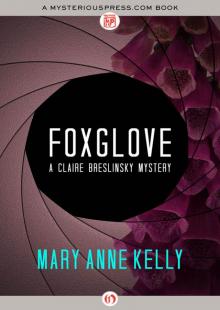 Foxglove
Foxglove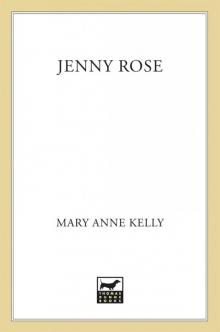 Jenny Rose
Jenny Rose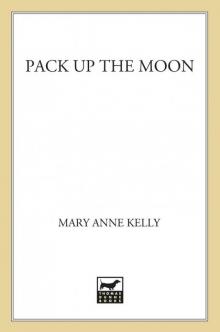 Pack Up the Moon
Pack Up the Moon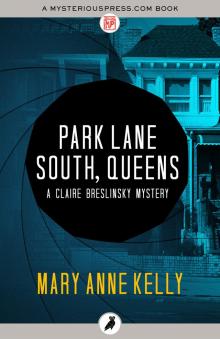 Park Lane South, Queens
Park Lane South, Queens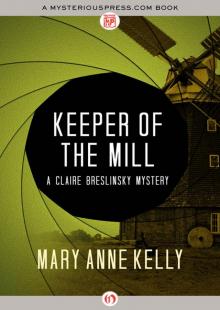 Keeper of the Mill
Keeper of the Mill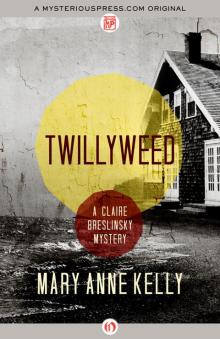 Twillyweed
Twillyweed